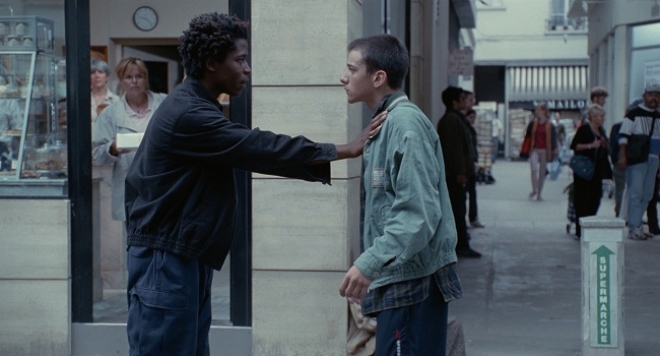
Stars:
Juliette Binoche, Thierry Neuvic, Josef BierbichlerStoryline
Jean, a farm lad, wants to escape his silent father; he runs to Paris to his older brother, Georges, who's away covering the war in Kosovo. Angry, he throws a bag of half-eaten pastry into a beggar's lap. Amadou, a young Franco-African, berates him. The police arrive, arrest Amadou and deport the beggar. Georges's girlfriend Anne is upset; it colors her relationship with Georges when he returns from the war. Separate lives intersect for the one moment, around the pastry bag, and all are altered. We follow each as repercussions of the incident play out. Deaf children bookend the film pantomiming words, feelings, and situations: what they are expressing?
User Reviews
A film for the end of days and, seemingly, every day beforeStrange. I saw within
24 hours one of the biggest frauds I've seen (the despicable 'Crash')
and one of the best films, 'Code Unknown'. Both pictures examine
preconception (be it racism, xenophobia, or like societal concerns) but
only 'Code Unknown' allows characters to live in the rhythm and cadence
of ordinary life as so many of us recognize it.
The picture
concerns the being of about 7 characters, typically catching those
involved at times that aren't necessarily, at least apparently,
advancing to a conventional plot. Scenes often begin in their ostensible
middle, characters are caught mid-sentence; this technique breathes a
sense of organic freedom into the people we are watching, a technique
that director Michael Haneke frequently uses to capture the reality of
people as they simply exist. Here, the nature of connection is examined
through the complex means of allowing the audience's preconceptions, as
well as some (certainly not all) of the characters, to add meaning and
gravity to what we see.
I loved this movie; seldom do I feel
privileged to be able to engage in the lives of those on screen. The
experience of watching 'Code Unknown' is akin to putting in earplugs and
watching random people interact: after some time, the interactions of
those we see become our own personal narrative, meaningful to us alone.
While this film has its meaning, it also understands that the viewer's
thoughts and feelings are just as relevant to the process as the film
crew's. To put it another way, 'Crash' would have been a miserable
failure of a movie even if I hadn't seen it. 'Code Unknown' seems to
come into being as its being watched, an experience between the
filmmakers and the viewers. Michael Haneke could make 10,000 more movies
and it wouldn't seem enough.
'Books > Movies' 카테고리의 다른 글
| Frantz (0) | 2017.05.18 |
|---|---|
| Le temps retrouvé, d'après l'oeuvre de Marcel Proust (1999) (0) | 2017.05.18 |
| paradise now (0) | 2017.05.18 |
| Loin des hommes (0) | 2017.05.18 |
| A Farewell To Fools (0) | 2017.05.18 |



